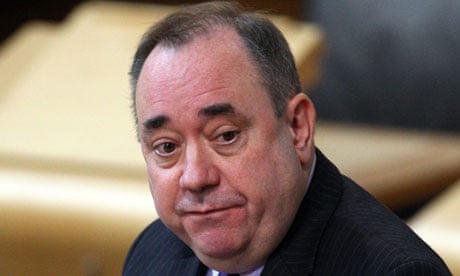Lord Justice Leveson has criticised Alex Salmond for being willing to breach the Scottish ministerial code by lobbying on behalf of Rupert Murdoch, while clearing the first minister of any specific wrongdoing.
The judge said the first minister showed a "striking" willingness to lobby the UK government in favour of Murdoch's buyout of BSkyB, by giving "irrelevant" advice about Scottish jobs, at the same time as negotiating with the Sun newspaper to win its editorial support in the Scottish elections.
Leveson said Salmond, who insisted throughout his inquiry evidence that he had a duty to protect Scottish jobs, was saved from criticism for acting improperly essentially because he failed to carry through with his promised lobbying of either Vince Cable, the business secretary, or Jeremy Hunt, then culture secretary.
Even so, it was wrong for Salmond to make that offer because it breached the ministerial code's rules forbidding partisan activity to support a specific firm's business interests. It was wrong for Salmond, Leveson ruled, to lobby UK ministers who were acting in a quasi-judicial capacity on the Sky bid.
Even if Salmond had no legal duties on the bid, "it does not follow that he was entirely at liberty to seek to persuade the secretary of state into error (particularly, if successful, it could potentially have had the effect of giving rise to grounds for challenge) …
"Mr Salmond's duty to promote the Scottish economy and Scottish jobs cannot sensibly be understood as requiring irrelevant submissions to be made to a quasi-judicial decision maker."
Leveson said the email evidence from News Corp about Salmond's talks with the Murdochs did not prove there was a deal to trade political favours for Murdoch's media influence, but he added: "Mr Salmond's readiness, when the subject was first raised in November 2010 and thereafter, to stand ready to assist News Corp is striking."
The judge said he had "absolutely no doubt" Salmond was motivated by his desire to protect Scottish jobs with Sky. That was entirely laudable, he said.
But Leveson cautioned: "How far that should be taken, however, is another matter. He appreciated that employment whether in Scotland or elsewhere was not a relevant consideration for the minister and, in fact, he never contacted either Dr Cable or Mr Hunt to argue the contrary.
"Judged by what he did, as opposed to what he said he was prepared to do, therefore, he cannot be criticised."
Salmond declined to respond directly to Leveson's criticisms of his conduct, although he insisted the ministerial code did require him to fight for Scottish jobs. A spokesman for the first minister claimed the report was a "complete vindication" of Salmond's actions.
However, Salmond said he believed Leveson's recommendations to have independent regulation underpinned by the law, as opposed to full statutory control, were very close to his proposals for a new Scottish regulatory body using the Irish model of an independent ombudsman.
Unlike control over broadcasting in Scotland, which is controlled by the UK government, the Scottish parliament is able to set up independent press regulation.
He has urged opposition leaders to hold cross-party talks, and then appoint a Scottish judge to propose a Scottish regulatory system. But opposition leaders said Leveson's criticisms of Salmond raised real doubts over the first minister's fitness to lead those talks.
Salmond said Leveson's report "puts us very much in the territory of the Press Council of Ireland which I think might well provide a good template for the way forward. Clearly, we will have to be satisfied that this can be done within the necessary context of a free press."
Willie Rennie, the Scottish Lib Dem leader, said Leveson's conclusions raised significant questions about Salmond's conduct, which raised doubts about whether the first minister could convene a cross-party group to agree press regulation in Scotland.
Rennie said Salmond was "the most heavily criticised politician" in the Leveson report. "He should offer to stand aside from the cross-party work. It should be led by someone untainted by the report," Rennie said.
Paul Martin, a Scottish Labour MSP and son of the former Commons speaker Michael Martin, said the report confirmed the first minister was prepared to act improperly: "It confirms that Alex Salmond offered to lobby the UK government on the Murdoch family's behalf and to have done so would have been wrong. The only thing that stopped that wrongdoing was that the UK government made a decision before Salmond got round to phoning them."

Comments (…)
Sign in or create your Guardian account to join the discussion